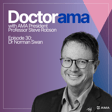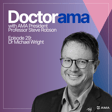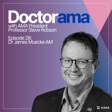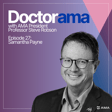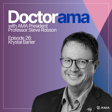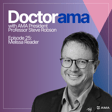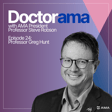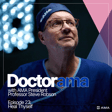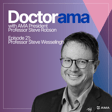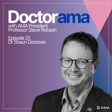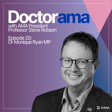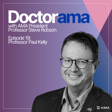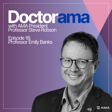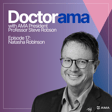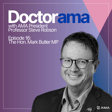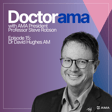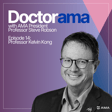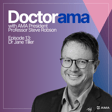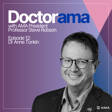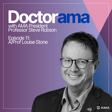Become a Creator today!Start creating today - Share your story with the world!
Start for free
00:00:00
00:00:01

Episode 31 - Dr Mike Freelander MP
In episode 31 of Doctorama AMA President Professor Steve Robson chats with Dr Mike Freelander MP.
Recommended
Transcript
Introducing Dr. Mike Freelander
00:00:00
Speaker
Over a number of Dr Rama podcasts, I've had the opportunity to speak to parliamentarians who are doctors. ah Professor Ryan and Dr Skomps have spoken with me in the past, but they're of course very new to the parliament. We've got something a little bit different today. We're going to be speaking to someone who really is an old hand on Dr Rama.
00:00:24
Speaker
You're listening to Dr Rama with Steve Robson, bringing you the best of health, medicine and people. Well, it's a real pleasure today to speak with a friend and colleague um who is also a parliamentarian and a doctor, Dr Mike Freelander, the member for MacArthur. Mike, welcome to Dr Rama. Oh, thanks so much, Steve. Great pleasure to be on with you.
00:00:48
Speaker
Look, it's a real pleasure for me as well. Michael, you were such a well-known paediatrician in the area where you worked. What was it about paediatrics that tempted you into the specialty in
From Paediatrics to Politics
00:01:03
Speaker
the first place? Well, I think paediatricians have the luxury of seeing people from day one of their entry into the world. and um I've always felt a bit of a bond with those kids that I saw and and increasingly I was finding that things that were beyond their control and their family's control and my control were directing their success in the wider world and their success in life. and I had the luxury of practicing in my area for a long time. My youngest child had left home. I'd always had an interest in politics.
00:01:42
Speaker
And I wanted to enter the political fray to see if I could change things for the better for those kids that I saw. So Michael, after so many years doing so many wonderful things for your community, and and I guess having looked after so many children, how did your patients take it when they found out that you were looking at a sort of maybe, shall I say, a later career change and moving from pediatrics into politics? How did that go down with your your patients?
00:02:10
Speaker
when When I explained the reasons, they were most people, most families were very supportive and um you know they could see the need for change in society, change in terms of the education system, in terms of access to jobs, in terms of infrastructure like transport infrastructure. They could see how Southwestern Sydney was missing out on a lot.
00:02:37
Speaker
and the need for improvements, particularly as our population has started to boom. And you know they so they've been very supportive and continue to be very supportive. I get so many people thanking me for trying to make life a bit better. It's it's difficult now for people um who are struggling. The cost of living crisis is a real crisis. The the mortgage issues that people are struggling with is a real problem. The rental crisis is a real problem. The lack of housing is a real problem.
00:03:12
Speaker
and They can see, people can see that the gaps between rich and poor, they're increasing. And you know my job is to try and change that.
Family and Patient Reactions
00:03:23
Speaker
And whilst I can sometimes see it being quite frustrating, I think what I can do is is have their voices heard in the the big Australian parliament. So Michael, I get a sense that once you're patients and I'm sure their parents heard your plans. They were supportive. But what about your own family? What did everybody say? You know, they say, dad, what are you thinking? How how did it go down and tell me about your decision making?
00:03:52
Speaker
Well, look, my wife has been incredibly supportive. She yeah you know grew up in the area of MacArthur. She could see how it was changing and could see the need for improvements. And she could also see my frustration with trying to get things for my patients, like education support and health support, all those sort of things. and she you know I said, well, go for it. We're we're very lucky. Our kids have all turned out to be pretty smart, pretty self-sufficient. They're all bloody opinionated, I've got to say. But they probably get that from their parents. But um yeah my wife was very, very supportive. We've been married now for 45 years. And I think she's got a pretty good ah idea of what makes me happy. and um
00:04:48
Speaker
I think she could see that I really wanted to do this and a great privilege to be able to do it. My kids thought, some of them thought I was crazy, um but I think underneath all they could understand and that not everyone is born as lucky as they've been and that it was time that we we we tried to get a bit of change.
Early Political Campaigns and Learning
00:05:09
Speaker
Michael, you first re elected to the Federal Parliament in 2016, is that right? That's right, yep.
00:05:16
Speaker
getting on for a while ago now, and obviously a very experienced parliamentarian, but how did you find the first election campaign? Because that's something that will be very different to your usual work as a long-term paediatrician in your community.
00:05:31
Speaker
yep Yep. Well, hard work. I think politicians do work hard. And I think it involves a change in mindset a little bit, um that you know people do need to have an opportunity to to express how they feel about life in general. and many people don't hold back in letting you know and letting you know um your deficiencies in supporting them. So you have to get you have to develop a bit of a thick skin and I must admit I don't really have a very thick skin. I'm not very good at dealing with you know criticism or insults and and you know I don't like to let things go. I like to always
00:06:20
Speaker
have a comeback, so but I've had to learn to curb that. So that's difficult. But also, it taught me a lot about people, about how they live and and the problems that people have. I mean, you know i when people complain about taxation and they say, oh, look, I work hard. and you know deserve every cent I've got. When you're doing, you know, 5.30 in the morning watching people catching a train to go to work, yeah you know, attempting to travel a couple of hours to and from work every day in in often very difficult jobs, you realize lots of people work hard.
00:06:59
Speaker
And you don't quite realize what a toll that takes on people. So I think it gives you a different perspective, doing door knocking, walking through the suburbs, being invited into people's homes and seeing how they live and how their families live is a real eye opener. People being honest with you about the struggles that they've had, I think, again, is a real eye opener. So I felt very privileged to be able to do it and a great learning experience.
00:07:28
Speaker
you know At my age, I'm still learning lots of things and so it's
Parliamentary Work and Health Initiatives
00:07:33
Speaker
been a good thing. so Michael, the transition from your work in the medical field as a paediatrician to a parliamentarian, when you realised you'd been elected, when you first went to the parliament, how did you cope with that adjustment, that change from the way you used to work to the new work of being a parliamentarian?
00:07:52
Speaker
Well, first of all, I've been supported by some really good people, some really good staff and some really good parliamentarians. I've got to make mention of my my very good friend, Chris Hayes, who I've known. Chris and Bernadette Hayes for a long, long time, long time before politics.
00:08:10
Speaker
as friends and they they they were fantastically supportive. Chris had been in Parliament for a long time and was the opposition whip when we were in opposition and he was very supportive and helpful to me and my some of my junior staff have been great as well. But I did approach it as a learning experience. and It took me a while before I was prepared to open my mouth that when I felt that the time was there, I think I've been pretty ah forceful in presenting the needs of the people that I've looked after for a long time. um And I still do do that. But it took me a while to get used to it. And to the dislocation of having to go to Canberra for half of the year. That was difficult. But on the other hand, um
00:08:57
Speaker
I'm now chair of the health committee, the standing committee on health. um That's given me a wonderful opportunity to see all around Australia and to visit places I wouldn't have been to before and even oversee some of the places I've been to like Myanmar and Cambodia and Laos and those places. It's really been an eye out before me and a great learning experience. So having said all that, I still see see myself as a as a doctor and I like to get involved in some of the medical issues that we've been looking at. It's a great privilege. Yeah well I think in particular you and I have spoken a lot about various um medical issues that have come across the parliament and in your purview but something which I know you put absolute heart and soul into was the parliamentary inquiry into diabetes.
00:09:49
Speaker
in Australia. um And we've spoken about that a lot and and yeah number of a number of times. I guess my first thing is dealing with something that is such a huge issue across the country and must i think see must have seemed overwhelming. What were your thoughts and how but how did you ah approach dealing with something that is just such a big issue? Well, one ah one of the the most important things in all the parliamentary inquiries I've been involved with, including the new frontier, how we approved new medicines and and treatments, the sleep study, the the study we we did into respiratory medicine, a whole range of things.
00:10:37
Speaker
um I've learned that you have to get a comprehensive view and you have to rely on the support of a whole range of organisations and I really appreciate the support of the AMA and yourself Steve and and and Michael Bonning, the NSW AMA president as well. um but ah we weve We get incredible support from all sorts of organisations.
00:11:04
Speaker
And they're they're really unselfish in giving us their information and their ideas and it's it's been fantastic. The diabetes inquiry, we heard not just from research organisations and doctors and nurses organisations and diabetes, but we we heard from a lot of individual people and some of the evidence they gave was quite harrowing.
00:11:28
Speaker
And to be able to hear their very personal accounts of dealing with diabetes or dealing with a child who's had diabetes and has passed away, or some of those very harrowing stories of ah personal loss and personal personal difficulties was a great privilege, but also a great responsibility. And that's why, I mean, I did put a lot of effort into it because I wanted to make sure that our in-report had recommendations that governments could and would take up. And I have committed to making sure that we still continue to push for our recommendations to be adopted by government. And I've had great support from the Health Minister Mark Butler in that as well. but But the whole thing was a tribute to all the other members of the Health Committee, including my medical colleagues like Sophie Scomps and Gordon Reed.
00:12:24
Speaker
Nick Rhyme, but also the other non-medical members, Melissa McIntosh, Julie and Anne Stanley, Mark Colton, all those people put a huge amount of effort into it because we did see it as something really important for the health of Australians.
Bipartisan Efforts in Health
00:12:39
Speaker
So Michael, one of the things I wanted to bring up was this sense of partisanship in Australian politics that I get where people really seem to, you know,
00:12:53
Speaker
have these hyper-partisan positions on things at the time. But the you've worked on things right across the the aisle and and with people from the different parties and independents and so on. How did you find that experience of bringing everybody together with you on a journey when you're looking at something as big as diabetes? did Did you find that it worked well and everybody was on the same page with you? To be honest with you, I always have. I think with really important issues, um people do get together and they do make an effort to make sure there is bipartisanship and multi-partisanship, I should say.
00:13:32
Speaker
I've been in Parliament now for eight years and I've never really had a personal difficulty with any member of Parliament, ever.
00:13:44
Speaker
um that, you know, we sure yell at each other across the floor in question time. But when they've been really important health issues, we have come together. We don't always agree on everything. That's true. um But, you know, I've worked with some really wonderful parliamentarians on all sides of parliament. Trent Zimmerman, is who's a great friend of mine,
00:14:08
Speaker
He's no longer in Parliament, but he was a member for North Sydney and he was the co-chair of the Health Committee when we were in opposition. He did some great work on the New Frontiers Report amongst others. Lisa McIntosh, who's a Liberal Member of Parliament for the seat of Lindsay, and andnna Western Sydney has been great. Julian Lisa, I have the greatest respect for his intelligence and his hard work and a really lovely guy. I get on very well with Mark Colton, the member for Parks and again, you know, Monique Ryan and Sophie Scomps, I get on very well with him. And I found that, you know, there's a lot of
00:14:50
Speaker
talk about partisanship, but when push comes to shove, most people work together very, very well and I have the highest respect for them. So Michael, I've got a question for you. I remember years ago, the story was that Mel Washer was like the doctor.
00:15:07
Speaker
for the parliament and and a lot of people would sort of seek medical advice when they were you know in the sitting weeks and things like that. Have you ever found yourself in the position of people saying, look, Mike, while you're here, I've got a this, that, the next thing or something, could you give me some advice?
Maintaining Medical Practice in Politics
00:15:23
Speaker
Does that happen? It actually happens a lot. um And I'm one of the few doctors in parliament that's maintained registration. I still do a clinic. I still see patients.
00:15:35
Speaker
in a hospital clinic at Campbelltown. And I did actually get a lot of very good advice from Mel, who is a lovely guy. He gave me a lot of advice, some of which is probably best not to be heard. have He gave me a lot of advice about how to deal with my colleagues. The commonest issue is you know On a Monday morning, I get a knock on my door.
00:16:02
Speaker
um you know ah you know I've come to Canberra from wherever. I've left all my medicines at home. Can you do me a script? And yeah generally, I say, yes. But then the question is, what medications are you on? And the usual answer is, ah the little green and white pill. They end up having to rig their Jeep and find out what's their answer. It actually takes a little bit more work than you would think.
00:16:33
Speaker
um but yeah and look Occasionally, I'll see someone in Parliament who has really a significant medical problem that needs to be sorted out. I've been on a couple of ambulance trips to hospitals with people. and You know, we've seen some things. Bivary colic is one. I saw a staffer with pretty florid Graves disease. You know, I've seen lots of things. We've had a couple of heart attacks while I've been in parliament. yeah So I do get asked a bit. There's a few more doctors who get asked for advice now, which is a good thing.
00:17:11
Speaker
All younger and smarter than me, like Gordon Reed and Sophie Spumps and Monique. And David Gillespie and I have been in the longest and we get asked a bit about things. Yeah. So Michael, I guess my my next question is a broad one and it comes without notice to you. But I mean, overall Australia has good health good health outcomes and a good and efficient health system, but there are always things we know that could be better. You've obviously sat ah in the parliament for a long time. You must have a feeling about things that should be a priority for whichever government is in power ah for a health system. What are your thoughts so along those lines?
Current Health Priorities in Parliament
00:17:58
Speaker
ah you're You're quite right, and I think that leads sometimes to a bit of frustration. um And as you know, there are many, many issues that um We're struggling with at the moment, the costs of healthcare care are huge. I think there's, you even though I'm a pediatrician, I think there's much more that can be done in aged care and end of life issues. We need to make sure we can get people out of acute hospital beds back into their own homes or even residential aged care, rather than being in an acute hospital bed. might Much more needs to be done there.
00:18:38
Speaker
I think people's understanding of health needs to improve a lot. I think there's a lot that could but more that could be done there. I think yeah the health of our children should be a priority. and It's not being prioritised quite as as urgently as I would like, although we are making and have made some significant changes with with improvements in in newborn screening for various different things. I think that we are in danger of developing a two-tiered health system at the moment and those tiers can vary between inner city, rural, regional and remote areas as well as to income levels and and access to health care. So these are highly complex
00:19:23
Speaker
issues that the the Health Minister Mark Butler is trying to address. I'd like things to happen a bit more quickly um and particularly in the equity of access area and I think there's a lot of reform needs to happen in in how our hospital system works but probably the biggest issue to me is i I am still a real believer in the general practitioner being at the cornerstone of good health care and being as the navigator of healthcare for his patient his or her patients. yeah And I'd like to see much more done to encourage people to go into general practice, not just by increasing payments, but by looking at how we can join our systems together, particularly our hospital system and our general practices. I think there's much more needs to be done there. And I'd like to see GPs back into our hospitals. I know that's a complex area and I know
00:20:20
Speaker
um It will require a lot of thought in how that's done, but we need to connect our systems much better. The same as we need to connect our aged care systems and our home care systems much better with our hospital practices. And I think that also we need to, and Bill Shorten is trying to do this, we need to make sure we clean up the NDIS.
00:20:45
Speaker
And we make sure that those with the most severe disabilities are the getting the care that they need. Yeah, I think all of those are so important, Michael. I just wanted to touch base a little bit about closing the gap. And i ah it's no secret, I personally was very invested um in the referendum last year that was not yeah um successful.
00:21:09
Speaker
and Since then we had ah data presented by the Productivity Commission only a few weeks ago that again showed that we were lagging and in fact some areas getting worse in the close the gap yeah metrics that that we use and that First Nations Australians really continue to have such a disadvantage in health in particular, um and I find that really
Indigenous Health Challenges
00:21:33
Speaker
distressing. I'd be interested in your experience over the years you've been in Parliament about the issue of First Nations Australians' health and wellbeing, if and if you had any particular thoughts along those lines.
00:21:49
Speaker
yeah Thanks, Stu. I think, um like you, yeah I wanted the referendum to be passed. It wasn't and we've got to move on.
00:22:01
Speaker
The closing the gap targets, I don't like them in that they are too short term. And I know certainly from a pediatric point of view, any changes occur over generations, not in the short term. And we can focus on the negativity. What I would like to see is more of a focus on the positive outcomes that we're having in Indigenous communities and certainly in you know the area the area of health and in my own electorate. We have Therawall, which is a fantastic Aboriginal controlled health service, and they do a great job and there's huge improvements in in health because of the work they do. I'd like to see more focus on education. um We have some fantastic education outcomes for First Nations people. We've seen more First Nations doctors, including GPs and specialists.
00:22:58
Speaker
um We are doing a lot better in terms of Aboriginal employment, particularly in our cities, now less so in some of the rural and regional areas. And there are lots of things happening that are worrying in terms of Indigenous incarceration and removal of children from families. And we need to work hard on those areas and we all need to work together on it. Obviously, there's lots of motherhood statements I could make. um But it's not easy, but it does require a lot of effort. There's some encouraging signs, even in places that seem to be under a lot of stress, like the Northern Territory with indigenous ranges and tourism and communities but working together to to improve outcomes across the board. I still think alcohol is a huge problem.
00:23:57
Speaker
um in those communities and I think much more needs to be done to reduce access to alcohol and I have some ideas about how we can do that.
00:24:08
Speaker
um I think one of the things that keeps on coming up with time and again is the cashless debit card for people on welfare payments. I think more needs to be done in educating people in those communities about how to deal with finances and have more voluntary access to cashless debit cards, things like that, rather than compulsory.
00:24:33
Speaker
and more needs to be done in early intervention in communities with little children and who are at high risk. And that requires investment. It really does. In things like housing, in clean water, we saw in our diabetes inquiry communities that had no power, no cooking facilities, no access to clean, potable water. And that can be fixed. It requires investment, but it can certainly be fixed. So the things that we can do, and it requires a big investment.
00:25:06
Speaker
And I'm all for that. I really do think we need to draw a line in the sand with this stuff and you know it needs to be controlled through the communities and we need to really step up what we've been doing and it needs to focus on the young children. Yeah. So Michael, I'm going to finish up here and ask you to give
Advice for Aspiring Politicians
00:25:29
Speaker
some advice. So there might well be people listening who think, you know, I would like to make a bigger contribution the name at the moment, people who are thinking about elected office. What advice would you give to to people listening who are thinking about perhaps putting themselves forward for elected office of as as you've done so successfully?
00:25:50
Speaker
Well, I think, you know, for my medical colleagues, I think there's a really a lot you can offer because you do see people at the coalface across a whole range of, you know, incomes and abilities and disabilities. and And I think, you know, all of my medical colleagues and all sides of parliament have both really given a lot. and So I think you can do a lot. You can also learn a lot. I've seen it as a huge learning experience and every day I learn something new. It is very fulfilling. um Even working in my constituent office where I am today, I met with a lot of people and I think I have been able to help them in some degree, be it in things like housing or immigration or social security. We can we can do a lot.
00:26:42
Speaker
But above all, you know I think you are working in a high-pressure environment, which doctors are used to and are good at. You can cope with change because, as you know, in health, things can change very quickly. So in many ways, we're pretty set up to deal with a political life. As I say, you do have to sometimes develop a thick skin, which I'm i'm still in all that.
00:27:07
Speaker
ah good at. But I think it's a really positive thing to do for the community. And and you can bring the community with you. um I mean, obviously, one of the frustrations, you as a doctor, you used to getting things done and saying things to people and expecting that they're going to take your advice immediately. I can tell you, many of my political colleagues have not treated me like that. But that's fine. You learn to deal with that.
00:27:35
Speaker
over over time and um i think really you know I still see myself as a doctor, not as a as a politician. um You can still do a lot of good, even in the in the small things. so i've i've enjoyed I've been very lucky to be able to have contact with people like you, Steve. and and organizations like like the AMA, which I've been a member of since 1976, I think. Oh, wow. And it's been a great journey for me. I'm very, very lucky. Michael, I want to thank you. I know how incredibly busy you are. And I want to thank you for taking the time to talk to me on behalf of our listeners on Dr. Armour today. Thanks, Steve. It's been a great pleasure.
Credits and Production Acknowledgment
00:28:31
Speaker
You've been listening to Dr Rama, a podcast produced on Ngunnawal country by the Australian Medical Association. All rights reserved.
